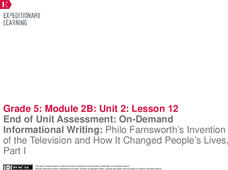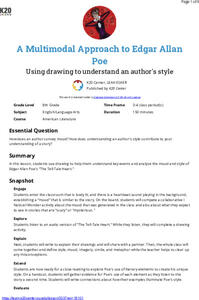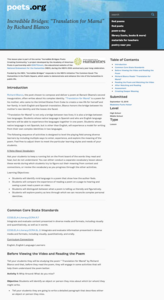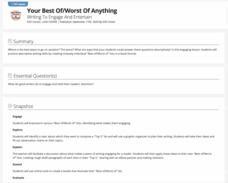EBSCO Industries
Music and Poetry
Song lyrics, like poems, are meant to be heard. After examining the literary devices in several poems, scholars examine the lyrics of popular songs and identify the sound devices and the figurative language writers use to create the...
EngageNY
End of Unit Assessment: On-Demand Informational Writing: Philo Farnsworth’s Invention of the Television and How It Changed People’s Lives, Part I
On-demand isn't just for TV anymore. Writers complete their end of the unit assessment with an on-demand writing task. They read the article Television and answer questions about the gist, vocabulary, and content. They then complete a...
National Endowment for the Humanities
Literary Genres in “Moby-Dick”
Moby Dick is more than a whale of a tale narrated by Ishmael. A lesson studying Herman Melville's classic novel asks readers to examine the different genres the author weaves into his story. Instructors model how to conduct a stylistic...
National Endowment for the Humanities
The Glass Menagerie: Impact of Expressionism
Young scholars are challenged to write a realistic analysis of Tennessee Williams' nonrealistic memory play, The Glass Menagerie. Writers use the evidence gathered on their worksheets to craft an effective thesis and concluding statement...
ReadWriteThink
Persuasive Essay: Environmental Issues
Young environmentalists learn how to craft a persuasive essay about an environmental issue they consider important. After studying the components of a persuasive essay and examining a student model, writers brainstorm possible topics and...
PBS
Exploring Identity and Intersectionality in Poetry
Just as Kermit the Frog notes, "It isn't easy being green!" it isn't easy occupying "multiple Identity spaces." Class members read and discuss poems by writers detailing what it is like when their identities are "oppressed."
Facing History and Ourselves
Three Good Things
A "Three Good Things" routine asks participants to sit quietly and reflect on three positive things in their world: family, school, community, or the world at large. After journaling about one that feels most important right now, writers...
K20 LEARN
A Multimodal Approach To Edgar Allan Poe Using Drawing To Understand An Author's Style
True! Poe's "The Tell-Tale Heart" makes readers nervous. But how? Young scholars create a drawing while listening to a reading of Poe's eerie tale to understand how writers create the mood of their stories and what their writing style...
K20 LEARN
"The Lady, Or The Tiger?" Which Do You Choose?: Internal and External Conflict
"How come there's no ending?" After a close reading of Frank R. Stockton's tale "The Lady, or the Tiger?" in which scholars examine each of the main characters' conflicts and motivations, writers craft their own ending using textual...
K20 LEARN
Allow Me To Introduce Myself: Writing A Letter Of Introduction
"Who am I?" is not only a great philosophical question that requires a lot of reflection but is also at the heart of a letter of introduction. The challenge, of course, is figuring out where to start. Middle schoolers get a little help...
K20 LEARN
Blackout Poetry: Re-Envisioning Writing
Introduce young poets to Blackout Poetry. Much like Found Poems, Blackout Poetry challenges scholars to rethink the process writers may use to craft their poems. After watching a short video in which poet Austin Kleon describes his...
K20 LEARN
Ethos, Logos, Pathos: Persuading Your Audience
Ethics, emotion, reason—scholars investigate advertisers' persuasive techniques to attract buyers. After examining the techniques used in infomercials, writers craft a persuasive essay on a topic of their choice.
K20 LEARN
Growing Themes
The theme of a work is not a single word! Rather it is a statement that reflects what a writer believes or wants readers to understand about a topic or subject. Here's a short, but powerful lesson that utilizes passages from The...
K20 LEARN
Ichabod and Brom - Ghostfacers: Credibility and The Legend Of Sleepy Hollow
A headless horseman? Really? A reading of "The Legend of Sleepy Hollow" launches a study of how to use the A-CLAP strategy to determine a story's credibility. Writers employ these techniques to craft their ghost stories and make them...
K20 LEARN
Let Us Start The Lettuce Club (Or Not): Writing A Thesis Statement
Let us be frank! Writers learn that crafting a thesis statement is not that difficult if one peals back the layers. After watching several videos about the elements of a thesis, class members read the article "Lettuce Club helps students...
Academy of American Poets
Incredible Bridges: “Translation for Mamá” by Richard Blanco
Who or what do you miss? That's the question that launches an activity that asks writers to craft a paragraph filled with sensory details that shows how they feel. Next, they listen to Richard Blanco reading his poem, "Translation for...
Core Knowledge Foundation
Unit 7: Anne Frank’s Tales from the Secret Annex Teacher Guide
Frequently banned, often challenged, a mainstay of middle school curriculum, Tales from the Secret Annex, is the featured text in the seventh unit in the Teacher Guide Core Knowledge Program. The 134-page guide includes an introduction,...
K20 LEARN
Your Best Of/Worst Of Anything: Writing To Engage And Entertain
It was the best of places! It was the worst of places! Middle schoolers practice their descriptive writing skills by creating an e-book about the best of/worst of topics. A series of activities about descriptive writing and worksheets...
Core Knowledge Foundation
Unit 5: Realms of Gold - Vol. 2 Poetry and Short Stories Teacher Guide
Seventh graders have a golden opportunity to learn how to read poems and short stories with a unit that introduces them to the techniques writers use to craft their works. They examine poems by William Carlos Williams and Edgar Allen Poe...
Curated OER
"The Story of an Hour" Lesson 4: Teacher's Guide and Notes
Learning how to summarize can be a challenge. Guide your writers through the process of summarizing a story using the children's tale; I Want My Hat Back for practice. Class members then use this "Somebody, Wanted, But, So, Then"...
Curated OER
"The Story of an Hour" Lesson 3: Teacher's Guide and Notes
The third lesson in "The Story of an Hour" series introduces young readers to analogies; a literary device writers use to add depth to their stories. Instructors identify the three analogies in the tale, and class members consider the...
K20 LEARN
Who Am I? Creating And Editing Descriptive Writing
With descriptive writing, the pleasure is in the details. Young writers learn how to add sensory details to a paragraph about themselves. They read a short paragraph and identify the sensory details used. After revising their draft...
K20 LEARN
The Monkey's Paw - Be Careful What You Wish For: Foreshadowing
W. W. Jacobs' horror story, "The Monkey's Paw," is used to introduce foreshadowing. As they advance through the story, young readers make predictions about what might happen next and how the story might end. Pairs work through the story...
K20 LEARN
Trigger Warnings - Intellectual Rights and Responsibilities: Banned Books, Censorship Part 1
"Warning: Conducting this activity may be harmful." Such statements, called "Trigger Warnings," are the focus of a two-part activity that looks at censorship, especially the pros and cons of trigger warnings. Class members read two...
Other popular searches
- Freedom Writers
- Writers Workshop
- Writers Notebook
- Writers Craft
- Freedom Writers Movie
- Writers Craft Story Starters
- Natural History Writers
- Writer's Workshop
- Writers Block
- Freedom Writers Diary
- Women Writers
- Beat Writers

























